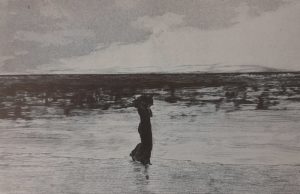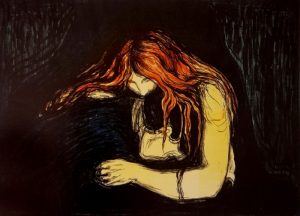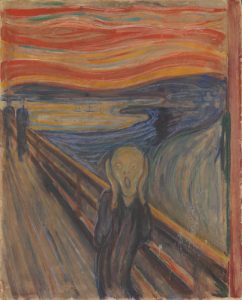Don’t fear having fear! Some people will tell you that having fear is somewhat pathologic. But have no fear (!) this feeling is as natural as any other human experience.
Even with such a delightful aspect of life like relating to the opposite sex, there may be reasons to have fear.




The four examples above are from the book „Kampf der Geschlechter“, 1995.
It may be useful to find out for what reason you have fear. If you can identify, say, a threat, you can take steps to contain it.
Good or bad
In any case, don’t jump to the conclusion that if feeling fear, then what you are facing must be bad. The English writer C. S. Lewis (1898-1963) knows better. You may have heard/seen his novel Narnia dramatized when you were a child. The characters of the story, even the heroes, feel fear when they meet the superhero named Aslan. Fear can be induced also by facing something good.
Change
Change is a matter of degree. You go through an education and come out more competent and as a slightly different person. Dramatic change, however, is likely to be accompanied by fear, even when it is for the better. In this sense our souls are conservative. Sustaining life is not only about biological survival. It is also about continuity – remaining the one you are.
So, what changes for the better could be scary? I find it hard to present an example. I believe we in Western culture are so ingrained in our understanding of the world, that we cannot even think of any radical, qualitative change for the better. This includes subjects by which there is disagreement. Take the “nature-industry-axis”, for instance. Some people are “green”, going for bio-food, carbon neutrality, and, if necessary, abstaining from economic growth. Others hold economic growth for a solution to the problems of our time. But would anybody even consider shifting side? Or could we think of any third alternative? Or could anybody think of any other way of dealing with this disagreement than counting votes? The latter points to liberalism as the overall “meta-identity” that binds us thinly together.
However, thinking of giving up liberalism certainly is scary. But who would suggest that that could be good?
Well, let me try. What would your reaction be?
Run back and close the door?
To run back and close the door is basically impossible. You cannot „unknow“ what you already have become to know. There is, however, a grey area, an area of doubt, between knowing and not knowing.
Envy?
Dealing actively with doubt takes some courage. But if you don’t have that, you can always fall into envy.
Envy „works“ well also when unconscious. If you feel indifference to someone, whom you, based on the relevance of the characteristics shown, might have admired, try the following thought experiment: What if the person in question had been your grown-up son or daughter? – or your brother/sister? Would you have taken pleasure in him/her showing the same characteristics?
Envy is, however, one of the seven deadly sins. It tends to destroy your life.
Getting to know?
Over time, more than just a handful of repressed knowledge may pile up and burden you. Getting to know the unknown, and possibly learning, is the best way, provided you can overcome fear and envy.
Artwork of the fortnight
First, you shall have to pull yourself together and look at this all-too-famous painting. Why is it so famous?

Because of the painting’s relevance, I will suggest. Moreover, Munch found an expression that is so persuasive, that nobody can take it for cheap, even if it refrains from nothing. There is not a single point in the image that does not contribute to the scream. This scream comes from the artist’s own heart and mind – not only from observing contemporary life.
But what is this fear about? Painted in 1893 we are in the middle of the so-called Belle Epoque. We are about to become wealthier than ever, and life will soon be physically more comfortable and safer than ever. But in 1893 we also leave the land of our ancestors and move to the cities. Our social and cultural references shift from the village with a little church to the towns and the streets. Better? Possibly, but even so, there may be a reason to have fear. We, the humans, anticipated that we would not be the same in the upcoming twentieth century.
- See also: Religious art, The battle of the sexes
Schreibe einen Kommentar